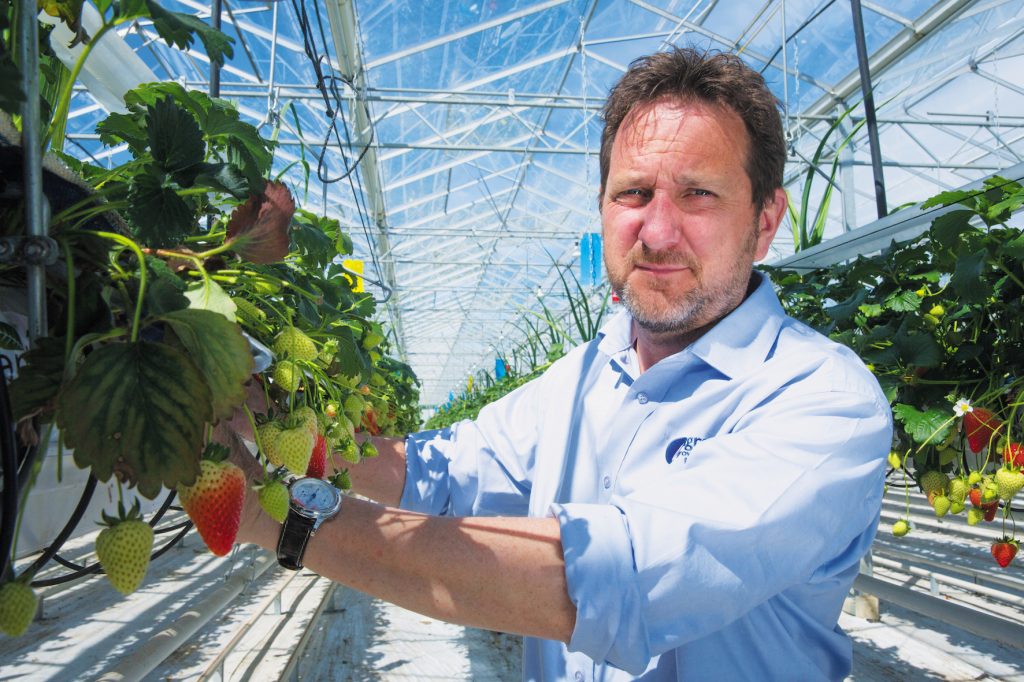On-farm support is key to biological pest control
20th February 2018
Bio-control of soft fruit pests is becoming increasingly complex and must be backed up with solid on-farm support based on expert knowledge and experience, argues Mark Davies, commercial head of

Mark Davies.
Bio-control of soft fruit pests is becoming increasingly complex and must be backed up with solid on-farm support based on expert knowledge and experience, argues Mark Davies, commercial head of fruit at Agrovista UK.
For some years the UK soft fruit industry has been pioneering the use of natural predators and integrated pest management systems in field-grown crops.
The advent of tunnels and more recently, the move to substrate-grown crops have helped the technology move on apace, creating an environment more conducive to the successful use of predators.
As a result, the control of pests such as two-spotted spider mite and western flower thrips have become relatively simple, with use of the predatory mites Phytoseiulus persimilis and Amblyseius cucumeris (now Neoseiulus cucumeris) respectively.
However, as chemistries disappear and new invasive pests such as spotted wing drosophila spread, the planning and monitoring of programmes has become much more complex.
It has become obvious that the commoditisation of the bio-control market, along with apparent lack of support from some quarters, has resulted in some growers spending an awful lot of money on a product that has every opportunity of failing due to applications that are either late, damaged by subsequent spray programmes, or even unnecessary in the first place.
If bio-control is to build on its recent successes, companies must be prepared to add value for their grower clients, rather than being seen as yet another cost. They must invest in on-farm support to ensure the technology delivers, protecting yield and quality and delivering good returns on investment.
In January 2017, Agrovista increased its UK fruit team by two to help meet this need. David Taylor and Simon Warren are both experienced in the use of bio-controls in soft fruit.
This has enabled the company to offer a programmed approach, which is monitored through the season and adapted as necessary, in conjunction with our bio-control partners, Koppert UK.
Using farm history, as well as crop walking, we successfully built programmes before the season began, and composed a delivery schedule. This initial process gives a grower confidence that the product will arrive on time and fresh, even in times of high demand. It also allows the grower to build a labour requirement in to his farm plan, so products can be applied as soon as they are delivered.
Once the programme is in place, the regular farm walks begin. Having eyes in the crop, focused on bio-control, supports the farm’s agronomy provision, which enables programmes to be altered according to pest pressure. This might mean treating hotspots, increasing rates broad acre, or reducing or removing applications if no longer necessary.
Berry Gardens grower, John Busby, of Littywood Farm in Staffordshire, told me the results spoke for themselves last season.
“Using farm history, and crop susceptibility data, David Taylor produced a plan for us,” he said. “On a fortnightly basis the farm was walked by David, allowing him to advise tweaks to that programme.
The result has been that we have been able to be organised in advance for applications, secure in the knowledge that we are applying the right product, of the right quality, at the right rates and at the right time.”
Agrovista now has a wide range of biological control products to choose from. The skill is in mixing and matching these options to give the grower genuine value for money.
Agrovista works closely with Koppert UK, part of Koppert Biological Systems. This world leader in bio-control is this year celebrating 50 years of pioneering development in the sector.
Koppert invests in staff and facilities to maintain the high levels of quality, reliability and support that we are used to, even though our business is growing rapidly.
This will enable us to support further advances in technology and research and ensure our growers continue to achieve optimum results and returns.
